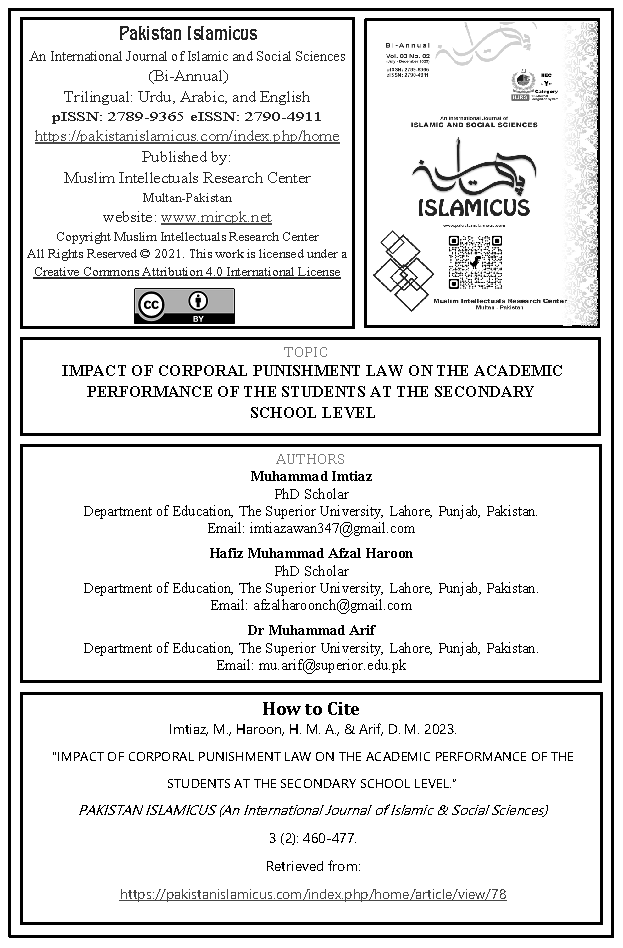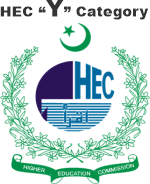IMPACT OF CORPORAL PUNISHMENT LAW ON THE ACADEMIC PERFORMANCE OF THE STUDENTS AT THE SECONDARY SCHOOL LEVEL
Keywords:
Corporal Punishment, Academic Performance, Achievement, Awareness, Educational OutcomesAbstract
Corporal punishment in schools has been a persistent and contentious issue worldwide. This comprehensive research article investigates the effects of corporal punishment laws on students' academic performance in public secondary schools in Kasur District, Pakistan. The study explores the prevalence of corporal punishment, its impact on academic achievement, and the awareness and opinions of teachers and students regarding its implementation. The research instruments involved were the students’ questionnaire (Cronbach Alpha, 0.69), which consisted of 53 items regarding the effect of and awareness about corporal punishment, and the teachers’ questionnaire (Cronbach Alpha, 0.92) which consisted of 49 items regarding corporal punishment law. The population of this study consisted of all secondary school teachers along with all students enrolled in secondary schools in Kasur district. Employing a descriptive research and survey design through a multistage random sampling technique, 32 schools, 125 teachers, and 750 students were selected; this research delves into the relationship between corporal punishment and students' educational outcomes, providing valuable insights into a critical aspect of the educational landscape. For the further implication of this research, it should be conducted on a large scale.
References
Abid, M. Y., Ghafoor, A., Javed, M. T., & Amjad, M. A. (2022). Impact of Non-linear Analysis of Crude Oil Prices on Domestic Inflation in Pakistan. Journal of Social Sciences Review, 2(4), 249–259. https://doi.org/10.54183/JSSR.V2I4.83
Ahmad, I., Said, H., & Khan, F. 2013, Effect of Corporal Punishment on Students' Motivation and Classroom Learning. Review of European Studies, 5(4)
Amjad, M. A. (2023). Moderating the role of social progress with greenhouse gases to determine the health vulnerability in developing countries. Environmental Science and Pollution Research, 30(40), 92123-92134. https://doi.org/10.1007/s11356-023-28867-1
Amjad, M. A., & Rehman, H. ur. (2023). The Long Run Dynamics of Sustainable Economic Development on Ecological Footprint in Developed and Developing Countries: Panel Quantile Regression. Review of Education, Administration & Law, 6(2), 191–210. https://doi.org/10.47067/real.v6i2.322
Amjad, M. A., & ur Rehman, H. (2023). The Long Run Dynamics of Sustainable Economic Development on Ecological Footprint in Developed and Developing Countries: Panel Quantile Regression. Review of Education, Administration & Law, 6(2), 191-210. DOI: https://doi.org/10.47067/real.v6i2.322.
Amjad, M. A., Asghar, N., & Rehman, H. U. (2021a). Can Financial Development Help in Raising Sustainable Economic Growth and Reduce Environmental Pollution in Pakistan? Evidence from Non-Linear ARDL Model. Review of Economics and Development Studies, 7(4), 475–491. https://doi.org/10.47067/reads.v7i4.406
Amjad, M. A., Asghar, N., & Rehman, H. ur. (2021b). Investigating the Role of Energy Prices in Enhancing Inflation in Pakistan: Fresh Insight from Asymmetric ARDL Model. Review of Applied Management and Social Sciences, 4(4), 811–822. https://doi.org/10.47067/ramss.v4i4.185
Amjad, M. A., Rafiq, F., Mahmood, Z., & Marsad, A. (2022). Exploring Youth Entrepreneurial Skills and Intention to Sustainable Start-up. Pakistan Journal of Humanities and Social Sciences, 10(4), 1291-1300. https://doi.org/10.52131/pjhss.2022.1004.0288.
Amjad, M. A., Rehman, H. ur, & Asghar, N. (2023). The Long-Run Dynamics of Green Technology, Ecological Footprint, and Health Vulnerability in Developed and Developing Countries. IRASD Journal of Economics, 5(2), 364–376. https://doi.org/10.52131/JOE.2023.0502.0133
Amjad, M. A., Rehman, H. ur, & Batool, I. (2022). Nexus between Tourism and Economic Growth in Pakistan: Using Gregory Hansen and ARDL with Structural Break. Review of Education, Administration & Law, 5(3), 387–397. https://doi.org/10.47067/real.v5i3.247
Anwar, S., Zeeshan, A., Gill, S. A., Raza, S. A., & Naqvi, S. A. H. (2021). Impact of Corporal Punishment on Students’ Academic Performance at Elementary Schools level. Psychology and Education, 58(3), 1846-1852.
Asghar, N., Amjad, M. A., & Rehman, H. ur. (2023). Analyzing the impact of access to electricity and biomass energy consumption on infant mortality rate: a global perspective. Environmental Science and Pollution Research, 30(11), 29550–29565. https://doi.org/10.1007/S11356-022-24144-9/TABLES/9
Asghar, N., Amjad, M. A., Rehman, H. ur, Munir, M., & Alhajj, R. (2022). Achieving sustainable development resilience: Poverty reduction through affordable access to electricity in developing economies. Journal of Cleaner Production, 376. https://doi.org/10.1016/j.jclepro.2022.134040
Asghar, N., Amjad, M. A., Ur Rehman, H., & Alhajj, R. (2023). Causes of Higher Ecological Footprint in Pakistan. Does Energy Consumption Contribute? Evidence from the Non-Linear ARDL Model. Sustainability , 15, 3013. https://doi.org/10.3390/su15043013
Aslam, B., Zhang, G., Amjad, M. A., Guo, S., & Ji, M. (2023). Does the impact of financial development reinforce sustainability ecological footprint? Fresh evidence from middle and high-income economies. Journal of Cleaner Production, 139573. https://doi.org/10.1016/j.jclepro.2023.139573
Cukuova D., (2009). Teachers' Perceptions on Corporal Punishment as a Method of Discipline in Elementary Schools. The Journal of Imternational Socis! Research , 2(8).
Ez-Elarab, H. S., Sabbour, S. M., Gadallah, M. A., & Asaad, T. A. (2007). Prevalence and risk factors of violence among elementary school children in Cairo. The Journal of the Egyptian Public Health Association, 82(1-2), 127-146.
Ghazi, S. R., Shahzada, G., Tariq, M., & Khan, A. Q. (2013). Types and causes of students’ disruptive behavior in classroom at secondary level in Khyber Pakhtunkhwa, Pakistan. American Journal of Educational Research, 1(9), 350-354. doi:10.12691/education-1-9-1
Herbert, K. (2009). The influence of discipline management by head teachers on students’academic performance in selected private secondaryschools of busiro county in wakiso district. Makerere Univeristy) retrieved: https://news. mak. ac. ug/documents/Makfiles/theses/Kiggundu_Herbert. pdf.
Kabandize, L. 1 (2004). Discipline in secondary schools in Kampala District. M. Ed. Thesis, Maker ere University Global Initiative to End All Corporal Punishment of Children, 2003, "Hitting People is wrong and Children are People too", 2nd Edition (Nottingham, England: Russell Press).
Kgomotso, M., Tshegofatso, A., & Boipono, M. (2015). Perceptions of teachers on the use of corporal punishment in schools: A case of Kang Secondary Schools. Research Journal of Educational Sciences ISSN, 2321, 0508.
Kilimci, S. (2009). Teachers’ perceptions on corporal punishment as a method of discipline in elementary schools. The Journal of International Social Research, 2(8), 242-251.
Naker, D., & Sekitoleko, D. (2009). Positive discipline: creating a good school without corporal punishment. Afrika: RaisingVoice.
Naker, D., & Sekitoleko, D. (2009). Positive discipline: creating a good school without corporal punishment. Afrika: RaisingVoice.
Newell, P. (2011). Global Initiative to End All Corporal Punishment of Children: Briefing for the Human Rights Committee.[Online]. South Africa: Available at url: http. www. info@ endcorporalpunishment. org.
Rafique, F., Hussain, S. W., Naushahi, M. M., Shah, S. K. H., & Amjad, M. A. (2023). Analyzing the Pump Diesel and Gasoline Prices on Inflation in Pakistan: A New Evidence from Non-Linear ARDL. Journal of Social Sciences Review, 3(2), 372-381. https://doi.org/10.54183/jssr.v3i2.270.
Rani, T., Amjad, M. A., Asghar, N., & Rehman, H. U. (2022a). Exploring the moderating effect of globalization, financial development and environmental degradation nexus: a roadmap to sustainable development. Environment, Development and Sustainability, 0123456789. https://doi.org/10.1007/s10668-022-02676-x
Rani, T., Amjad, M. A., Asghar, N., & Rehman, H. U. (2022b). Revisiting the environmental impact of financial development on economic growth and carbon emissions: evidence from South Asian economies. Clean Technologies and Environmental Policy, 24(9), 2957–2965. https://doi.org/10.1007/S10098-022-02360-8/TABLES/5
Roos, R. (2014). Attitude of Youth towards Corporal Punishment”: A Case of Karachi”. OSR Journal of Humanities and Social Science (IOSR-JHSS), 19(12), 85-89.
Saunders, B. J., & Goddard, C. (2009). Physical punishment in childhood: The rights of the child. John Wiley & Sons.
Sial, M. H., Arshed, N., Amjad, M. A., & Khan, Y. A. (2022). Nexus between fossil fuel consumption and infant mortality rate: a non-linear analysis. Environmental Science and Pollution Research, 29(38), 58378–58387. https://doi.org/10.1007/s11356-022-19975-5
Umezinwa, R. N., & Elendu, I. C. (2012). Perception of teachers towards the use of punishment in Sancta Maria primary school Onitsha, Anambra State, Nigeria. Perception, 3(2).
UNICEF (2009). Parliamentarians act on violence against children in Latin America and the Caribbean WHO (2009): The Universal Report on Prevention of Child Injuries, Punjab Right to Free and Compulsory Education Ordinance 2014, Islamabad, Pakistan, 15 October 2009, CRC/C/PAK/CO/3-4, Concluding observations on third/fourth report, paras. 47, 48, 80 and 81
UNICEF (2010). Global Initiative to end all Corporal Punishment of children, Pakistan country report Child population: Retrieved date, 18.11.14 Society for the Protection of the Rights of the Child (SPARC), Reported in The Express Tribune, 27 June2013)
Universal Periodic Review of Pakistan's human rights record, 2013, Reportedin TheExpress Tribune,27 June2013
Wang, H., Amjad, M. A., Arshed, N., Mohamed, A., Ali, S., Haider Jafri, M. A., & Khan, Y. A. (2022). Fossil Energy Demand and Economic Development in BRICS Countries. Frontiers in Energy Research, 10(April), 1–15. https://doi.org/10.3389/fenrg.2022.842793
Wasef, H.N, (2011). Corporal punishment in schools. The American University in Cairo School of Global Affairs and Public Policy, Public Policy and Administration Associate Professor and Chair, AUC.

Downloads
Published
Issue
Section
License
Copyright (c) 2023 PAKISTAN ISLAMICUS (An International Journal of Islamic & Social Sciences)

This work is licensed under a Creative Commons Attribution 4.0 International License.
This work is licensed under a Creative Commons Attribution 4.0 International License.

































